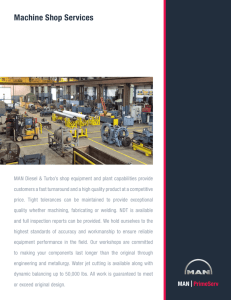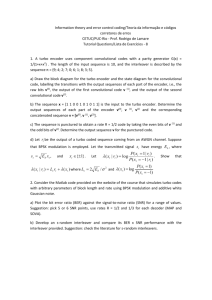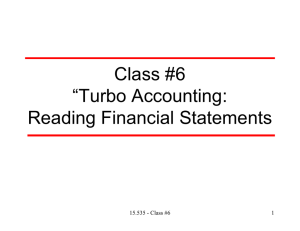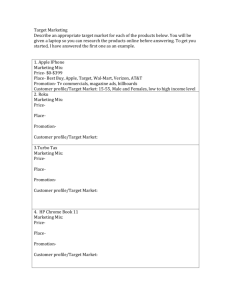Mr. Ali Hussain Mugaibel Dr. Maan Kousa 16 March 1999 CETEM’ 99
advertisement
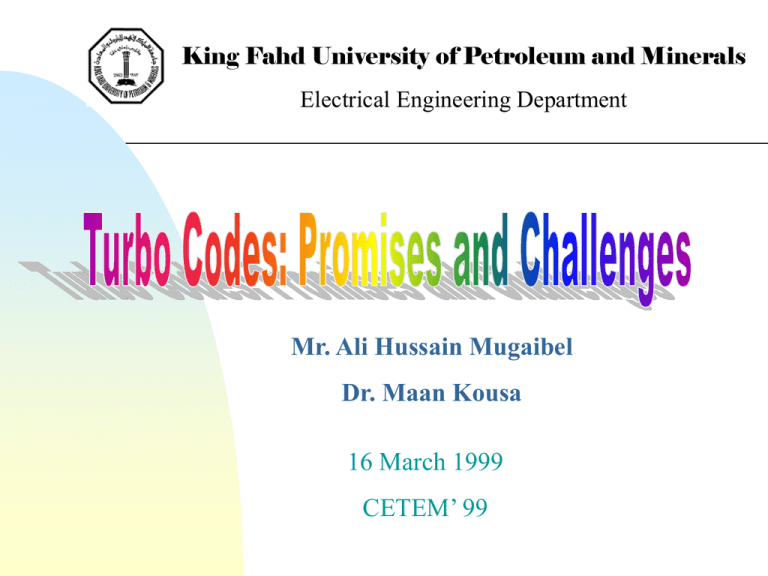
King Fahd University of Petroleum and Minerals Electrical Engineering Department Mr. Ali Hussain Mugaibel Dr. Maan Kousa 16 March 1999 CETEM’ 99 Topics of Discussion Turbo Codes Introducing turbo codes. Turbo Encoders Turbo Decoders Promises Challenges Can we Improve TC ? Conclusion Mugaibel/Kousa Turbo Codes: Promises and Challenges , CETEM' 99 Coding Source Channel Convolutional Block X0 + Input 1011 101101 101101 010110 0010110 1001011 01D 10D 10D 0 D + (a) Mugaibel/Kousa Turbo Codes: Promises and Challenges , CETEM' 99 X1 What are turbo codes ? New class of CC. Introduced in 1993 by Berrou, Glavieux and Thitimajashima. Perform close to Shannon limit in terms of BER. Use iterative scheme with reference to the turbo engine principle. Mugaibel/Kousa Turbo Codes: Promises and Challenges , CETEM' 99 Turbo Encoder More than one CC are linked in parallel by interleavers. Information Source PAD X0 Interleaver Enc 1 X1 Enc 2 X2 Puncturing & Parallel/Serial MUX Figure 1: Simplified Turbo Encoder Mugaibel/Kousa Turbo Codes: Promises and Challenges , CETEM' 99 to the channel Turbo Encoder Important factors : RSC encoders Termination Puncturing Input X0 + Input D D D D X0 + + (a) X1 D D D + (b) Figure 2: (a) Classical Non-Recursive Non- Systematic Code (b) Recursive Systematic Code Mugaibel/Kousa Turbo Codes: Promises and Challenges , CETEM' 99 D X1 Turbo Decoder SOVA: SOVA is supposed to be the least computation intensive method compared with MAP, LogMAP,... (Interleaver 1)-1 Decoder 1 r0 r1 Interleaver 1 Decoder 2 DEMUX Mugaibel/Kousa Turbo Codes: Promises and Challenges , CETEM' 99 Turbo Decoder Important factors : Iteration DEMUX Synchronization Main idea The decoder will pass the hard decision together with a reliability estimate of this decision to the next decoder p( x 1 y ) p(uk 1) k ,1 k ,1 ln L(uk ) I ln p(uk 1) p( xk ,1 1 yk ,1 ) Mugaibel/Kousa Turbo Codes: Promises and Challenges , CETEM' 99 Promises The major promise of turbo codes is their astonishing performance of bit error rate (BER) at relatively low Eb/N0. For AWGN channel: for a frame size of 256256=65536 bits we can achieve a BER=10-5 at only Eb/N0=0.7dB, which is very close to Shannon limit. For a Rayleigh fading channel: a BER=10-5 can be achieved at Eb/N0=4.3dB which represents a gain of 2.3dB as compared to classical convolutional codes with similar complexity. Mugaibel/Kousa Turbo Codes: Promises and Challenges , CETEM' 99 Challenges Delay: associated with interleaver and the iterative decoding algorithm. Complexity: in the optimal decoding algorithm. Can we use Turbo Codes for real time applications ? Can we improve Turbo Codes ? Can we introduce a mathematical model for the evaluation of different Turbo Codes ? Mugaibel/Kousa Turbo Codes: Promises and Challenges , CETEM' 99 Can We improve Turbo Codes ? A good understanding of the code ingredients will help to improve the code. If we understand what the interleaver is doing we can introduce short frames suitable for real time applications. Puncturing is very important to increase the rate to an applicable value. The decoding algorithm can be sufficiently simplified yet with very minor degradation. Mugaibel/Kousa Turbo Codes: Promises and Challenges , CETEM' 99 Conclusion We have reviewed Turbo Codes and some of their promises and challenges. Turbo Codes are attracting more and more applications. More work can be done in understanding the effects of the codes ingredients on the performance. The decoding delay is a major challenge in turbo coding Turbo Coding can be applied as a case study for many of the existing systems ( GSM, IS….) Mugaibel/Kousa Turbo Codes: Promises and Challenges , CETEM' 99
